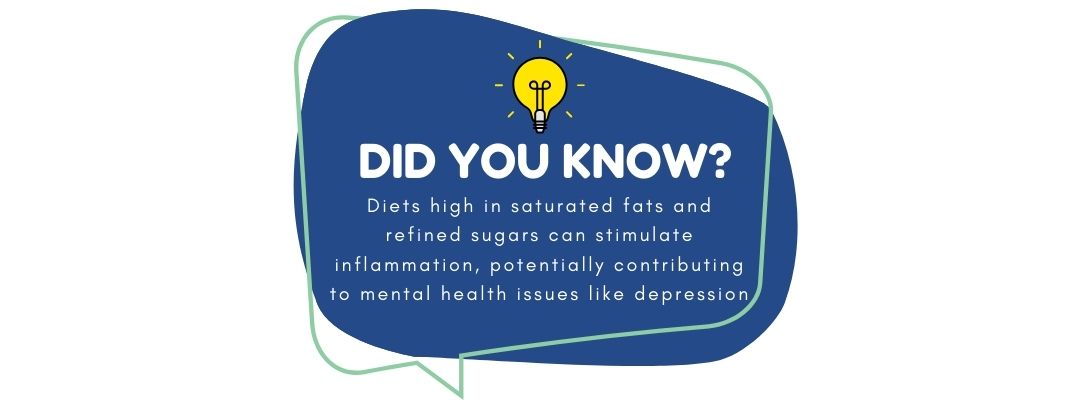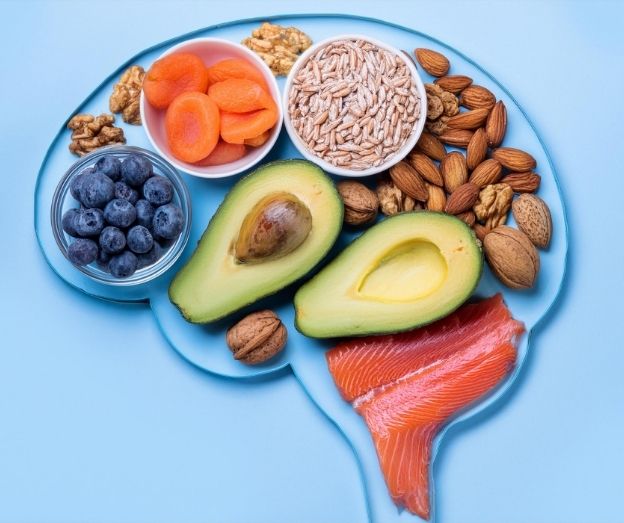The Role of Nutrition in Mental Health: Exploring the Connection Between Diet and Well-Being
Let’s answer the question of what is the role of nutrition in mental health. Proper nutrition can greatly influence mental health and well-being. A balanced diet rich in essential nutrients positively impacts mood, cognitive function, and can even reduce symptoms of anxiety and depression. As more studies emerge, the connection between what people eat and how they feel becomes increasingly clear.
Understanding the importance of nutrition is vital for anyone interested in enhancing their mental health. Nutritional psychiatry emphasizes the role of diet in mental health treatment, highlighting the need for more research and awareness in this area. With the right dietary changes, individuals can take significant steps toward improving their mental well-being.
Adopting healthy eating habits can contribute to a more stable and balanced mood. Mental health professionals advocate for diets that support brain health, reflecting a growing recognition of how nutrition is intertwined with emotional and psychological wellness.
Key Takeaways
- Good nutrition supports better mental health outcomes.
- Dietary changes can improve mood and cognitive functions.
- More research is needed to explore nutrition’s full potential in mental health.
 Source: British Medical Journal
Source: British Medical Journal
Fundamentals of Nutrition and Mental Health
Nutrition plays a vital role in mental health. Specific nutrients, both macro and micronutrients, can significantly influence brain function and mood. Understanding the fundamental relationships between diet and mental well-being can help in making informed choices.
Macronutrients and Their Effects on Mood
Macronutrients include carbohydrates, proteins, and fats, each influencing mood and cognitive functions differently.
- Carbohydrates are crucial for producing serotonin, a neurotransmitter that helps regulate mood. Foods like whole grains and fruits can enhance serotonin levels.
- Proteins are important for neurotransmitter production. Amino acids from dietary proteins are building blocks for neurotransmitters like dopamine and norepinephrine, which can affect mood and attention.
- Fats are essential for brain health. Omega-3 fatty acids, found in fish, walnuts, and flaxseeds, are linked to reducing symptoms of depression and improving overall brain function.
Micronutrients’ Role in Brain Function
Micronutrients, such as vitamins and minerals, are also important for mental health.
- B Vitamins, particularly B6, B12, and folate, support energy levels and improve cognitive function. They are critical for neurotransmitter synthesis.
- Vitamin D has been associated with mood regulation. Low levels have been linked to depression, making sun exposure and fortified foods key to maintaining adequate levels.
- Minerals like magnesium, zinc, and iron support brain chemistry. Magnesium helps with stress reduction, zinc is vital for cognitive stability, and iron ensures oxygen delivery to the brain.
Gut-Brain Axis: The Impact of Digestive Health
The gut-brain axis highlights the connection between digestive health and mental well-being.
- A diverse gut microbiome can enhance mood and reduce anxiety. Probiotics from fermented foods like yogurt and kimchi can support gut health.
- Dietary fiber nourishes beneficial gut bacteria, which in turn can produce short-chain fatty acids (SCFAs) that positively impact brain function.
- Inflammatory processes linked to poor gut health may contribute to mental disorders. A balanced diet rich in antioxidants from fruits and vegetables can help combat this inflammation.
Understanding these connections emphasizes the importance of maintaining a nutritious diet for optimizing mental health.
Dietary Patterns and Psychological Well-Being
Diet and nutritional choices significantly influence psychological health. Various dietary patterns have specific effects on mental well-being, from enhancing mood to reducing anxiety and depression. This section explores the impact of the Mediterranean diet, plant-based diets, and the Western diet on mental health outcomes.
Mediterranean Diet and Mental Health
The Mediterranean diet emphasizes fruits, vegetables, whole grains, and healthy fats like olive oil. Research shows that individuals following this diet experience lower levels of depression and anxiety.
Key components include:
- Fruits and Vegetables: Rich in vitamins and antioxidants that support brain health.
- Omega-3 Fatty Acids: Found in fish, these nutrients are linked to reduced depression rates.
- Whole Grains: They stabilize blood sugar levels, which can positively affect mood.
Overall, a Mediterranean diet may foster emotional resilience and cognitive function.
Plant-Based Diets and Cognitive Function
Plant-based diets, which focus on whole foods derived from plants, offer various mental health benefits. Studies indicate that individuals who consume more fruits, vegetables, nuts, and legumes tend to have better cognitive function.
Important aspects include:
- Nutrient Density: These diets are high in vitamins, minerals, and fiber, promoting overall brain health.
- Reduced Inflammation: Plant-based foods can lower inflammation markers, possibly lowering mood disorders.
- Gut-Brain Connection: A healthy gut promotes mental well-being, and plant-based diets can enhance gut microbiota diversity.
Adopting a plant-based diet may lead to improved mood and cognitive performance.
Western Diet and Its Psychological Consequences
The Western diet, characterized by high sugar, processed foods, and unhealthy fats, has been linked to negative mental health outcomes. Increased consumption of these foods correlates with higher rates of anxiety and depression.
Key concerns include:
- High Sugar Intake: Excess sugar can lead to energy crashes and mood swings.
- Processed Foods: Often low in nutrients, these foods may fail to support brain health.
- Unhealthy Fats: Diets high in trans fats can affect mood regulation negatively.
Individuals adhering to a Western diet may experience various psychological challenges, making dietary choices crucial for mental health.
Nutritional Psychiatry
Nutritional psychiatry explores the connection between diet and mental health. It examines how specific foods and dietary patterns can influence emotional well-being and aid in the treatment of mental disorders. This field encourages evidence-based dietary practices to improve mental health outcomes.
Evidence-Based Dietary Recommendations
Research in nutritional psychiatry highlights the importance of specific dietary patterns. Diets rich in whole foods, such as the Mediterranean diet, have shown promise in supporting mental health. Key foods include:
- Fruits and vegetables: High in vitamins and antioxidants that reduce inflammation.
- Whole grains: Support stable blood sugar levels and energy.
- Healthy fats: Sources like fish and nuts improve brain function.
Incorporating these foods may benefit individuals dealing with depression and anxiety. Additionally, minimizing processed foods and sugar can positively impact mood and cognitive function. Several studies advocate for targeted dietary changes to complement traditional mental health treatments.
Food as Medicine: Treating Mental Health Disorders
The concept of “food as medicine” emphasizes using nutrition to address mental health issues. Nutritional psychiatry suggests that diet changes can serve as a complementary approach to psychotherapy and medication.
Certain nutrients are vital for brain health:
- Omega-3 fatty acids: Found in fatty fish, these can reduce symptoms of depression.
- B vitamins: Important for energy production and neurotransmitter function.
- Probiotics: Support gut health, which is linked to mood regulation.
By tailoring nutritional plans to individual needs, it is possible to enhance treatment of mental disorders. Integrating dietary changes into comprehensive care models can lead to improved mental health outcomes.
Challenges in Nutritional Mental Health
Several factors impact the role of nutrition in mental health. These include access to healthy food choices and socioeconomic factors that contribute to nutritional disparities. Addressing these challenges is crucial for enhancing mental well-being through diet.
Access to Healthy Food Choices
Access to nutritious food is not equal for everyone. Many individuals live in food deserts, areas where healthy options are scarce. This limits their ability to make beneficial dietary choices. In urban settings, supermarkets may be miles away, making it hard to obtain fresh produce, lean proteins, and whole grains.
Transportation issues also play a significant role. Without reliable transport, people may resort to convenience stores that offer processed foods high in sugar and fat. These limitations can worsen mental health conditions.
Additionally, the availability of affordable foods impacts families significantly. High-quality, nutritious foods often cost more, putting them out of reach for lower-income households. A lack of access to healthy options can lead to poor dietary habits, which may negatively affect mental health.
Socioeconomic Factors and Nutritional Disparities
Socioeconomic status greatly influences dietary choices and overall health. Individuals from lower-income backgrounds frequently face challenges in affording healthy foods. Financial constraints can force them to prioritize cheaper, less nutritious options.
Education also plays a role. Those with limited nutritional knowledge may struggle to make informed dietary choices. This lack of understanding can contribute to unhealthy eating patterns, which impact mental well-being.
Cultural factors can further complicate nutritional access. Traditional diets may not include the necessary nutrients for mental health. Moreover, stigma around mental health can prevent individuals from seeking help or support, exacerbating dietary issues. Addressing these socioeconomic disparities is essential for improving mental health outcomes through nutrition.
Future Directions in Nutrition and Mental Health Research
Research into nutrition’s impact on mental health is evolving rapidly. This section discusses innovations in nutritional neuroscience and examines public health strategies that can leverage these findings for mental well-being.
Innovations in Nutritional Neuroscience
Recent advancements in nutritional neuroscience are revealing how specific nutrients affect brain function. Studies show that omega-3 fatty acids, found in fish, can reduce inflammation in the brain and improve mood.
Probiotics are also gaining attention for their role in gut health, which is increasingly linked to mental health. The gut-brain axis suggests that gut microbiota can influence mood and cognitive functions. More research is needed to identify exact mechanisms and optimal dietary recommendations.
Genetic factors may also play a role, offering personalized nutrition plans based on individual DNA. This can lead to tailored dietary interventions for mental health disorders.
Public Health Strategies and Policy Implications
Public health strategies must adapt to incorporate nutritional guidance for improving mental health. Governments can work to promote food policies that enhance access to nutrient-rich foods. Programs that provide education on nutrition can empower communities to make healthier choices.
Schools should implement nutrition programs that target mental well-being, offering meals that meet specific dietary needs. By prioritizing mental and nutritional health together, they can reduce future mental health issues among youth.
Collaboration between health professionals and policymakers is essential. This ensures that findings from nutritional research directly inform public health strategies and create effective interventions.
Frequently Asked Questions
Nutrition plays an important role in mental health, affecting emotional stability and cognitive function. Specific dietary patterns and nutrients can influence psychological well-being, while deficiencies may increase the risk of mood disorders.
What is the connection between dietary patterns and mental well-being?
Dietary patterns, such as the Mediterranean diet, are linked to better mental health. These diets emphasize fruits, vegetables, whole grains, and healthy fats, which can improve mood and reduce anxiety.
Can specific nutrients in one’s diet influence psychological health?
Certain nutrients, like omega-3 fatty acids, B vitamins, and antioxidants, are crucial for brain health. They can help regulate mood and have been shown to lower the risk of depression.
How does proper nutrition contribute to cognitive functioning and emotional regulation?
Proper nutrition supports brain development and function. A balanced diet provides essential energy and nutrients needed for optimal cognitive performance and emotional balance.
What evidence exists linking dietary habits to the risk of developing mood disorders?
Research indicates that poor dietary habits are associated with a higher risk of mood disorders. Diets high in processed foods and sugars may lead to negative mood changes and increased depression.
In what ways do vitamins and minerals impact neurological and mental health?
Vitamins and minerals play critical roles in neurotransmitter function and brain health. For example, vitamin D and magnesium are linked to mood regulation and cognitive function.
How might dietary interventions be utilized in the treatment or management of mental health conditions?
Dietary interventions can serve as a complementary approach in managing mental health conditions. Personalized nutrition plans can improve symptoms and overall well-being by addressing specific nutrient deficiencies.
Conclusion: The Role of Nutrition in Mental Health
In conclusion, high-functioning depression can be a silent, yet impactful, struggle for many individuals. Despite outward appearances of normalcy and success, the internal battle with persistent sadness, fatigue, and hopelessness can be overwhelming. Recognizing the signs and understanding its complexities is crucial for providing the necessary support and care. With appropriate treatment strategies—including therapy, medication, and holistic practices—individuals can manage their symptoms and improve their overall quality of life. It is important to remember that even those who seem to function well may be facing significant emotional challenges. Encouraging open communication, fostering supportive relationships, and seeking professional help are key steps in addressing high-functioning depression and promoting mental health awareness.
You’re not alone, and help is always within reach. Contact us today at (774) 619-7750 and take control over your mental health.




